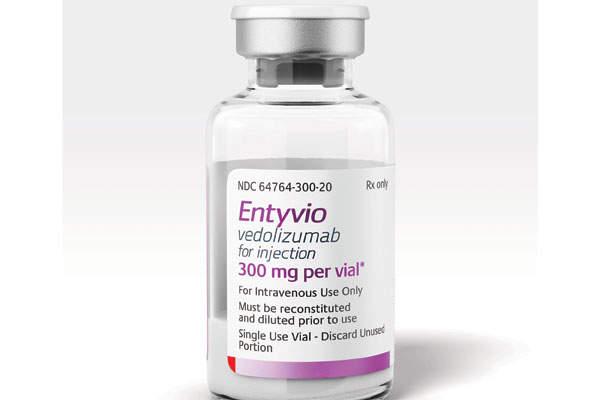Entyvio Side Effects
Generic name: vedolizumab
Note: This document contains side effect information about vedolizumab. Some dosage forms listed on this page may not apply to the brand name Entyvio.
Applies to vedolizumab: powder for solution, solution.
Serious side effects of Entyvio
Along with its needed effects, vedolizumab (the active ingredient contained in Entyvio) may cause some unwanted effects. Although not all of these side effects may occur, if they do occur they may need medical attention.
Check with your doctor or nurse immediately if any of the following side effects occur while taking vedolizumab:
More common
- Body aches or pain
- chills
- difficulty with breathing
- ear congestion
- fever
- headache
- loss of voice
- sneezing
- sore throat
- stuffy or runny nose
- unusual tiredness or weakness
Less common
- Back pain
- chest tightness
- flushing
- nausea and vomiting
- weakness
Rare
- Cough
- difficulty with swallowing
- dizziness
- fast heartbeat
- hives, itching, or skin rash
- puffiness or swelling of the eyelids or around the eyes, face, lips, or tongue
Incidence not known
- Bloating
- blurred vision
- clay-colored stools
- confusion
- constipation
- dark urine
- drowsiness
- headache
- indigestion
- loss of appetite
- lower back or side pain
- painful or difficult urination
- pains in stomach, side, or abdomen, possibly radiating to the back
- seizures
- unpleasant breath odor
- vomiting of blood
- yellow eyes or skin
Other side effects of Entyvio
Some side effects of vedolizumab may occur that usually do not need medical attention. These side effects may go away during treatment as your body adjusts to the medicine. Also, your health care professional may be able to tell you about ways to prevent or reduce some of these side effects.
Check with your health care professional if any of the following side effects continue or are bothersome or if you have any questions about them:
More common
- Difficulty with moving
- joint pain
- muscle pain or stiffness
For Healthcare Professionals
Applies to vedolizumab: intravenous powder for injection, subcutaneous solution.
General
The most common adverse reactions were nasopharyngitis, headache, arthralgia, nausea, pyrexia, upper respiratory tract infection, fatigue, cough, bronchitis, influenza, back pain, rash, pruritus, sinusitis, oropharyngeal pain, and pain in extremities.[Ref]
Dermatologic
Common (1% to 10%): Rash, pruritus, eczema, erythema, night sweats, acne
Uncommon (0.1% to 1%): Folliculitis[Ref]
Gastrointestinal
Common (1% to 10%): Nausea, oropharyngeal pain, gastroenteritis, anal abscess, anal fissure, dyspepsia, constipation, abdominal distension, flatulence, hemorrhoids[Ref]
Genitourinary
Frequency not reported: Urinary tract infection[Ref]
Hepatic
Frequency not reported: Elevations of transaminase, elevations of bilirubin, hepatitis, ALT elevations, AST elevations[Ref]
Hypersensitivity
Common (1% to 10%): Infusion related reactions (e.g., infusion site reaction, infusion site pain, infusion site irritation)
Very rare (less than 0.01%): Anaphylactic reaction (e.g., dyspnea, bronchospasm, urticaria, flushing, rash, increased blood pressure, increased heart rate)[Ref]
Immunologic
Common (1% to 10%): Influenza
Uncommon (0.1% to 1%): Bacterial sepsis, septic shock
Frequency not reported: Sepsis, tuberculosis, salmonella sepsis, Listeria meningitis, giardiasis, cytomegaloviral colitis[Ref]
Musculoskeletal
Very common (10% or more): Arthralgia (12%)
Common (1% to 10%): Back pain, pain in extremities[Ref]
Nervous system
Very common (10% or more): Headache (12%)
Common (1% to 10%): Paresthesia[Ref]
Oncologic
Rare (less than 0.1%): Transitional cell carcinoma, carcinoid tumor of the appendix
Frequency not reported: B-cell lymphoma, breast cancer, colon cancer, malignant hepatic neoplasm, malignant lung neoplasm, malignant melanoma, lung cancer of primary neuroendocrine carcinoma, renal cancer, squamous cell carcinoma[Ref]
Other
Common (1% to 10%): Pyrexia, fatigue[Ref]
Respiratory
Very common (10% or more): Nasopharyngitis (13%)
Common (1% to 10%): Upper respiratory tract infection, cough, bronchitis, influenza, sinusitis
Very rare (less than 0.01%): Pneumonia[Ref]
Local
Uncommon (0.1% to 1%): Infusion site reaction (e.g., infusion site pain, infusion site irritation), infusion related reaction, chills, feeling cold[Ref]
Cardiovascular
Common (1% to 10%): Hypertension[Ref]
Frequently asked questions
- How much does Entyvio cost per month?
- Is Entyvio an immunosuppressant or a biologic?
- How long does it take Entyvio to start working?
- Can I drink alcohol while taking Entyvio?
- Entyvio and the COVID vaccine, what should I know?
- Does Entyvio cause weight gain?
- Does Entyvio increase the risk of cancer?
- Can I take antibiotics while on Entyvio?
- Does Entyvio cause joint pain?
More about Entyvio (vedolizumab)
- Check interactions
- Compare alternatives
- Pricing & coupons
- Reviews (153)
- Drug images
- Dosage information
- Patient tips
- During pregnancy
- Support group
- FDA approval history
- Drug class: selective immunosuppressants
- Breastfeeding
- En español
Patient resources
Professional resources
Related treatment guides
References
1. Product Information. Entyvio (vedolizumab). Takeda Pharmaceuticals America. 2014.
Further information
Always consult your healthcare provider to ensure the information displayed on this page applies to your personal circumstances.
Some side effects may not be reported. You may report them to the FDA.

